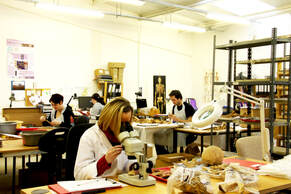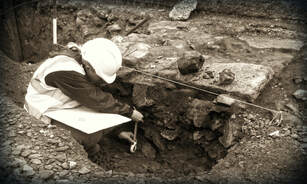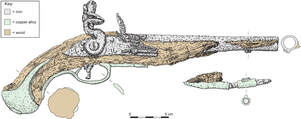|
THE APPROACH OF RUBICON HERITAGE TO ARCHIVING AND COMMERCIAL ARCHAEOLOGY IN IRELAND. During the last 22 years, Rubicon has undertaken a huge range of archaeological projects, ranging from residential and renewable energy developments to larger, more complex schemes, such as flood relief / wastewater schemes and infrastructural improvement schemes. Rubicon have also been involved in Archaeological Services Contracts on numerous road and rail schemes, both rural and urban. However, once the digging stops the work is not finished – in some ways, the most challenging stage of the works is just beginning! The final stage of any project, once the required reports have been completed, is producing a well organised archive. We now have a dedicated archiving department that focuses on the preparation of archives for each and every project to keep us and our clients compliant with all national legislation and guidance required for projects undertaken within the planning system. Post-excavation work is a key element of all projects that require excavation. Most projects are carried out under the terms of an archaeological licence and have strict contractual requirements and deadlines in relation to post-excavation work. Rubicon maintains an excellent record in the completion of post-excavation work within the defined timescales and to the satisfaction of the project stakeholders. We employ some of the most experienced project managers in the country, who manage projects from birth to grave- including post-excavation and archiving. As we are involved in such a wide range of archaeological and heritage services, we are acutely aware of:
 Following the Celtic Tiger years and the associated boom in development, Rubicon built up a significant number of post-excavation projects, many of which took several years to bring to publication. During this time Rubicon accumulated a large volume of material, which was maintained in temporary storage in line with the guidelines. Once all post-excavation work was complete, our focus moved to submitting the resulting archives to the NMI/ NMS. Each archive had to be meticulously examined and made consistent. In some cases finds needed to be relabelled and repackaged. The paperwork had to be sorted and prepared and the information from the sites had to be entered into the NMI/ NMS databases. Upon inspection and acceptance from the NMI/ NMS these archives were transferred and deposited. Our Approach Materials are prepared according to the guidelines and inspected by the NMI/ NMS. Once they are accepted, they are transferred and deposited with the NMS.  The paper archive includes material ranging from old slides and photos, registers, recording sheets and method statements through to digital files and reports. Methodology: At commencement of the archiving, we ensure we have the most up to date copy of ‘Guidelines and Forms for the Transfer of Excavation Archives to National Monuments Services Archive’. Compliant acid free boxes, manila folders and tubes are obtained. The archives are prepared according to the ‘Guidelines for producing database records for Archaeological Archives’ and presented along with the completed submission database for each archive. Box lists, a transfer form and cover memo are prepared in accordance with the NMS directives. All boxes and folders are marked/filled in line with the NMS Guidelines. Once ready, the box lists of all material, cover memo and transfer list for complete archives are sent to the NMS digitally for review. Any comments are addressed. Once all documentation is found to fulfil the standards of the NMS Donation Access Database an inspection of the material is arranged. Archives are inspected at Rubicon’s Midleton Office in advance of deposition and confirmed to be of the correct standard.  The finds archive includes object such as prehistoric, medieval and post-medieval pottery, lithics, worked bones, stone, glass and metal artefacts. Recent assemblages included conserved objects such as 277 sherds of a Middle Bronze Age vessel and a late 18th century flintlock pistol! The batch also included (all processed) 1441 environmental samples, 147 slag samples, 50 wood samples, 1653 animal bone samples, 2 human cremations and 4 human skeletons! Methodology: At commencement of the archiving, we ensure we have the most up to date copies of the NMI templates for excavations tables/finds registers and box lists. Communication with the NMI is critical during the process. All finds are cross-checked with the excavation reports finds registers and measurements and descriptions of the finds are extracted from the specialist’s reports. Details of the environmental samples are also submitted as per NMI requirements. The finds and ecofacts are packed in line with the Rubicon Heritage Policy and procedures for dealing with different archaeological objects post-excavation. These procedures are based on the NMI Advice Notes, IAI Code of Conduct for the Treatment of Archaeological Objects/human remains and CIfA Standard and Guidance for the collection, documentation, conservation and research of archaeological materials. Once a database has been completed and accepted, an inspection of the material is carried out in Rubicon’s office in Midleton. Once inspected and accepted the archive is deposited with the NMI. Comments are closed.
|
Categories
All
Archives
December 2023
|
This section will not be visible in live published website. Below are your current settings:
|
|
|
|
|
|
Cork
|
DUBLIN
|